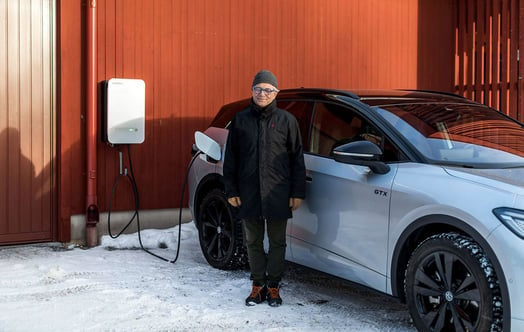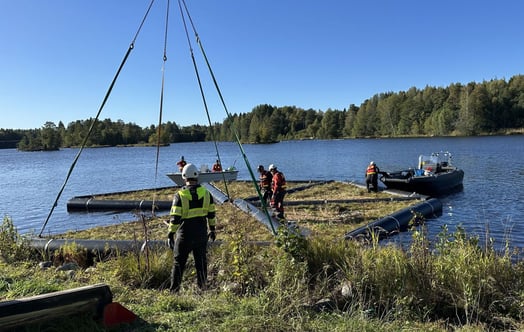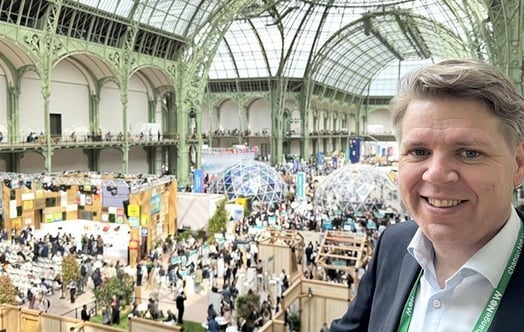HYBRIT: SSAB, LKAB and Vattenfall to begin industrialization of future fossil-free steelmaking by establishing the world’s first production plant for fossil-free sponge iron in Gällivare
SSAB, LKAB and Vattenfall are now taking a new, decisive leap forward in their work to make fossil-free steel for the global market. Industrialization of the technology being developed through HYBRIT will start in Gällivare, northern Sweden, where the world’s first production plant for fossil-free sponge iron – from feedstock to steel – is being planned.
“We are world leaders in the work to transform the steel industry and are now stepping up the pace. We are doing this for the climate, customers, competitiveness and for employment. That we are now raising ambitions for a completely fossil-free value chain is unique and a message of strength from SSAB and our HYBRIT partners. We are seeing a clear increase in demand for fossil-free steel and it is right to speed up our groundbreaking cooperation,” says Martin Lindqvist, President and CEO at SSAB.
Industrialization is intended to start with the first demonstration plant, which will be ready in 2026, for the production of 1.3 million tonnes of fossil-free sponge iron in Gällivare. The demonstration plant will be integrated with iron pellet making and is part of LKAB’s transition plan. The goal is to expand sponge iron production to a full industrial scale of 2.7 million tonnes by 2030 to be able to supply SSAB, among others, with feedstock for fossil-free steel. The choice of Gällivare for establishing of the plant was based on a joint assessment of industrial synergies, where proximity to iron ore, logistics, an electricity supply and energy optimization were important factors.
“Together, we will lead the transformation of the iron and steel industry, and with HYBRIT we will now start our historic transformation to be the future supplier of sponge iron. The whole process starts with top quality iron ore in the mine and our transition plan gives strong economies of scale that pave the way for the competitive production of fossil-free steel by our customers. This is the greatest thing we can do together for the climate. Once we are ready, we will reduce the global emissions of our customers by 35 million tonnes a year, which is equivalent to the triple the effect of parking all passenger cars in Sweden for good,” says Jan Moström, President and CEO at LKAB.
SSAB and LKAB deepen the partnership
At the same time, SSAB and LKAB will deepen their partnership to create the most effective fossil-free steel value chain from mine to steel, to customer. We will support and enable each other’s transformation, with Vattenfall as an enabler of the huge need for fossil free electricity and hydrogen gas. On the back of an acceleration of HYBRIT together with LKAB’s strategy and deeper partnership, SSAB will now explore the prerequisites to convert to fossil-free steel production in Luleå faster than planned. The plan to convert Oxelösund in 2025 remains unchanged, as does our goal to be the first to market, in 2026, with fossil-free steel.
Access to fossil-free electricity decisive
There are many advantages to locating the new sponge iron plant in Gällivare, which is also in close proximity to LKAB’s mining production and processing. Using iron ore pellets that are already warm in the process will save huge amounts of energy. On top of this, 30% of weight will be eliminated from transport since hydrogen gas will be used to remove the oxygen in the iron ore. Gällivare also offers good access to fossil-free electricity from Vattenfall.
“Sweden and HYBRIT have a world-leading position in making fossil-free iron- and steelmaking a reality and the initiative will now be further scaled up. That fossil-free electricity and groundbreaking processes will in principle help to eliminate climate-affecting emissions completely from iron- and steelmaking is a flagship example of Vattenfall’s strategy to enable a fossil-free life within a generation. It is now extra important that the permit processes can deliver at the same pace as fossil-free steelmaking,” says Anna Borg, President and CEO at Vattenfall.
FACTS/HYBRIT initiative
- Hybrit Development AB, which is owned by SSAB, LKAB and Vattenfall, is developing the technology to make steel using hydrogen gas instead of coal, which will minimize climate harmful carbon dioxide emissions from production.
- The HYBRIT pilot plant will be able to make fossil-free sponge iron to make fossil-free steel for prototypes to customers already in 2021.
- The initiative has the potential to reduce carbon dioxide emissions by 10% in Sweden and 7% in Finland, as well as contributing to cutting steel industry emissions in Europe and globally.
- Within a few months, HYBRIT is expected to be able to progress to testing using hydrogen in iron ore reduction reduce at the pilot plant in Luleå, and so SSAB expects to be able to deliver the first fossil-free steel to customers for prototype manufacturing already in 2021.
- The HYBRIT initiative is developing technology to challenge the existing commercially available technology. The aim in principle is to eliminate carbon dioxide emissions from the process by using fossil-free feedstock and fossil-free energy in all parts of the value chain.
- Today, the steel industry generates 7% of total global carbon dioxide emissions. With HYBRIT, SSAB, LKAB and Vattenfall aim to create a completely fossil-free value chain from mine to finished steel and to introduce a completely new technology using fossil-free electricity and hydrogen instead of coal and coke to reduce the oxygen in iron ore. This means the process will emit ordinary water instead of carbon dioxide.
- Hybrit Development AB is a research and technology development company that will deliver solutions for the plants and will play an important role in both projects. Technology development is taking place in close collaboration with the owner companies.
- The HYBRIT initiative was started in 2016 by the three owners, SSAB, LKAB and Vattenfall. The pilot plant for direct reduction in Luleå was inaugurated in August 2020. There are also plans for an underground storage facility in the rock for fossil-free gas.
- Another sponge iron plant is pIanned for Gällivare and this will be operating in 2030 to process total production from the first fossil-free pellet plant. Total capacity will be 2.7 million tonnes of fossil-free sponge iron a year.
- HYBRIT has received significant support from the Swedish Energy Agency through Industriklivet, the government's long-term venture to support the industry's conversion to net zero emissions.
For further information, please contact:
Viktoria Karsberg, Head of Corporate Identity and Group Communications SSAB, +46 72 233 5288
Niklas Johansson, Senior Vice President Communication and Climate LKAB, +46 72-450 52 19
Magnus Kryssare, Press officer Vattenfall, +46 76-769 56 07



